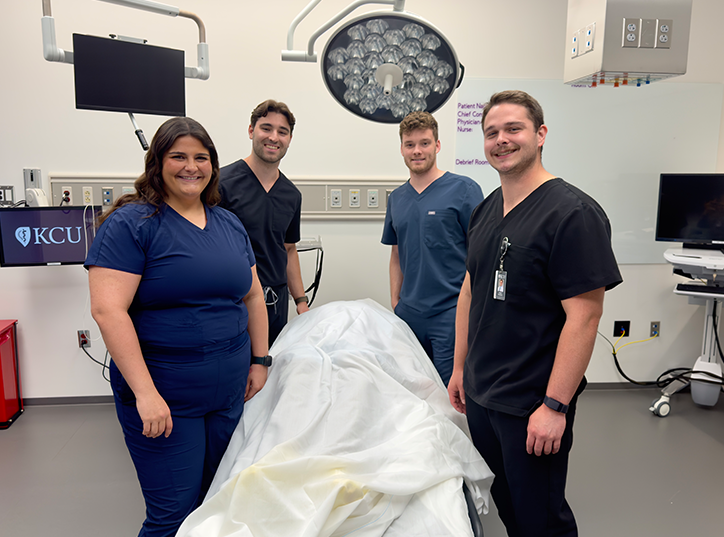How the anatomy lab sparked KCU student doctors’ paths and a published study

Kansas City University (KCU) medical students are gaining national attention with a newly published study in Springer Nature Link, a platform known for hosting high-impact scientific and medical research. Authored by students Robert J. Heins, Jordan Konstanty, Justine Hemaya, and Travis Hodge, and mentored by Anthony Olinger, PhD, professor of anatomy at KCU, the study reflects that medical school isn’t only about learning medicine—it’s about advancing it.
The team’s research focused on anatomical differences between male and female cadavers, revealing significant disparities that could have a direct impact on surgical safety. Findings showed that 13 percent of female cadavers had high-risk anatomical variations, compared to only 2 percent of males, a discovery with meaningful implications for surgical planning and precision.
Anatomy changed everything
For lead author Robert Heins, the experience of studying anatomy didn’t just enhance his education—it changed his entire vision for his future in medicine.
“I came in thinking I’d only go into internal medicine,” Heins said. “But after being in the lab, I realized I could possibly see myself doing surgery or should at least consider a procedure heavy specialty in the future. Anatomy changed everything for me.”
Hemaya echoed that transformation after her time in the lab.
“I was between emergency medicine and OB-Gyn coming into school. After anatomy, I was fully committed to either OB-Gyn or surgery,” Hemaya said. “That hands-on lab time clarified what I love.”
As Heins described it, the lab experience embodied a core principle of osteopathic medicine: treating the whole patient requires a deep, tactile understanding of anatomy.
“The way we treat the whole patient requires a deeper anatomical understanding, and our curriculum reflects that,” Heins said.
The power of the Gift Body Program
At the center of these transformative experiences is KCU’s Gift Body Program, a foundational element of its anatomy curriculum. Unlike many medical schools where cadaveric dissection is limited or entirely replaced by digital simulations, KCU students begin hands-on anatomical training from day one, working directly with real human donors.
This immersive, physical interaction with human anatomy builds not just knowledge, but the kind of surgical intuition that’s difficult to teach in a lecture hall.
Heins credits the program with teaching him skills he couldn’t have learned any other way.
“Developing those skills in your hands, you literally cannot replicate that anywhere else,” Heins said. “Knowing what type of tension to apply to tissue, how to move through layers. That comes only from working with real donors.”
For Hemaya, the impact was just as profound. The opportunity to witness and work through the intricacies of the human body, beyond what any textbook could show, brought learning to life in a way she hadn’t expected.
“It was probably the best experience ever to learn from the cadavers,” Hemaya said. “Being able to see the variations of anatomical structures and correlate that to function. It’s pretty surreal,”
But the Gift Body Program is about more than technique. It also instills a powerful sense of purpose and gratitude. Students are continually reminded that behind each donor is a person who made a selfless choice to contribute to the future of medicine.
This rare blend of technical mastery and human connection elevates the program from educational to truly transformative. For many students, it’s the moment when medicine stops being theoretical and becomes deeply real.
Student research that stands out
This publication highlights not only the academic strength of KCU’s medical program but also its deep commitment to giving students a platform to explore, contribute and lead. With research experience already under their belts, these students are entering the next phase of their careers with clarity and confidence.
There’s no shortage of research opportunities here,” Hemaya said.
KCU continues to empower future physicians through coursework and by providing opportunities for real, hands-on discovery that helps shape both medical science and the professionals behind it.Share this:
